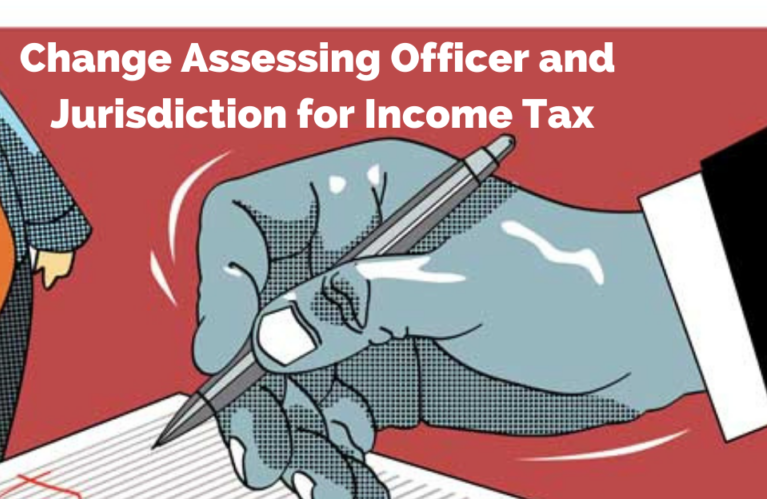Navigating the complexities of the Income Tax Act is crucial, especially when it comes to understanding the jurisdiction of an Assessing Officer (AO). Section 124(4) provides taxpayers (or “assessees”) with a structured approach to challenging an AO’s jurisdiction before an assessment is completed. Below, we break down the critical aspects of this section and explain how it impacts taxpayers’ rights.
1. The Right to Challenge Jurisdiction
Section 124(4) of the Income Tax Act grants an assessee the right to question the jurisdiction of the AO managing their case. This provision enables taxpayers to raise concerns if they believe that their assigned AO may not be the most suitable based on specific factors like location or expertise. The objective is to ensure fair treatment and prevent jurisdictional conflicts during the assessment process.
Example Scenario: Suppose an assessee resides in Delhi but is assigned an AO in another state, which might cause delays and complications. In this scenario, the assessee can invoke Section 124(4) to challenge the AO’s jurisdiction to ensure that their case is handled more conveniently.

2. Assessing Officer’s Responsibility in Responding to the Jurisdiction Challenge
When an assessee challenges an AO’s jurisdiction, the AO has a duty to assess the validity of the claim. Section 124(4) clarifies that if the AO believes the claim lacks merit, they are required to take specific steps rather than proceeding directly with the assessment.
Example Scenario: If an assessee claims that their assigned AO lacks jurisdiction, and the AO disagrees, they cannot ignore the challenge. They must adhere to the steps in Section 124(4) to address the jurisdictional issue properly.
3. Referral for Determination Under Sub-Section (2)
If the AO is not satisfied with the assessee’s jurisdictional challenge, Section 124(4) mandates that they must refer the matter to higher authorities under sub-section (2) for a final determination. This referral process involves a senior officer or designated authority reviewing the jurisdictional question and making a conclusive decision before the AO can proceed with any assessment actions.
Example Scenario: An AO in Mumbai reviews an assessee’s jurisdiction challenge but finds the claim unfounded. In this case, the AO must escalate the matter for resolution under sub-section (2), allowing a higher authority to make a final ruling.
4. Timing for Raising Jurisdiction Challenges
It is essential for the assessee to raise any jurisdictional challenge before the assessment is made. If raised after assessment procedures have begun, the chance to question jurisdiction may be forfeited. Section 124(4) emphasizes that jurisdictional matters should be resolved upfront to avoid disruptions in the assessment process.
Tip for Taxpayers: To ensure correct handling, taxpayers should promptly raise any objections to jurisdiction as soon as they are aware of their assigned AO.
Why Jurisdiction Matters in Income Tax Proceedings
Jurisdiction is more than just location; it encompasses the authority and scope under which an AO can operate. Having the appropriate AO can streamline processes, reduce communication issues, and ensure a more accurate assessment.
For example, specific regions may have specialized AOs with expertise in local tax matters, making it more effective for taxpayers to be handled by the right authority.
How Taxpayers Can Leverage This Provision
If you believe your case should be managed by a different AO, leverage Section 124(4) by:
- Filing a Jurisdiction Challenge: Raise your concerns by officially challenging the AO’s jurisdiction as soon as you are notified of the AO assigned to your case.
- Supporting Your Claim: Present valid reasons why a different AO should handle your case based on location or specific circumstances.
- Following Up on Referral: If the AO disagrees with your challenge, monitor the status and resolution of the referral for a fair outcome.
Frequently Asked Questions (FAQs)
Q1: What does jurisdiction mean in the context of an Assessing Officer?
A1: Jurisdiction refers to the authority or geographical area where an AO can conduct assessments, often based on the assessee’s residence or business location.
Q2: When should an assessee challenge an AO’s jurisdiction?
A2: The challenge must be raised before the assessment starts, ensuring the objection is valid and timely.
Q3: What if the AO does not agree with the jurisdiction challenge?
A3: The AO must refer the matter to higher authorities under sub-section (2) for a conclusive ruling on jurisdiction before proceeding with assessment.
Q4: Will the jurisdictional challenge delay the assessment?
A4: Yes, while the jurisdiction matter is resolved, the assessment may be delayed to ensure it is managed by the appropriate AO.
Conclusion
Section 124(4) of the Income Tax Act is a vital tool for taxpayers, offering them the ability to ensure that their tax assessment is handled by the right Assessing Officer. By allowing assessees to challenge jurisdiction and requiring the AO to either validate the claim or refer it for higher determination, this provision promotes transparency and fairness in tax proceedings. Taxpayers should be proactive in understanding and exercising their rights under this section to avoid jurisdictional conflicts and ensure a seamless assessment process.
In a complex tax environment, having jurisdictional clarity is essential, as it can significantly impact the efficiency and accuracy of assessments. By using Section 124(4) effectively, taxpayers can ensure their cases are handled appropriately, providing peace of mind and promoting trust in the tax system.



